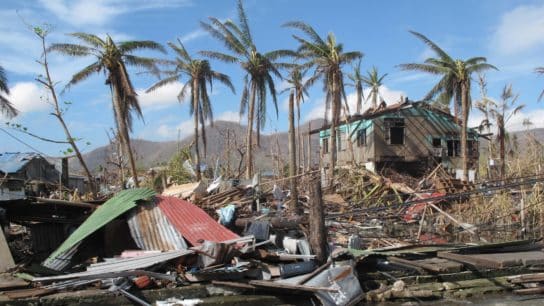Parts of Austria, Czech Republic, Hungary, Poland, Romania and Slovakia were flooded over the weekend as Storm Boris unleashed record-breaking rainfall. It comes after Europe’s hottest summer on record and unprecedented heat in the Mediterranean and Black Sea, which scientists say fuelled the storm.
—
Parts of central and eastern Europe are experiencing some of the worst flooding events in modern history, which over the weekend killed at least eight people and displaced tens of thousands across several countries.
Floods have affected parts of Austria, Czech Republic, Hungary, Poland, Romania and Slovakia. They were triggered by Storm Boris, which unleashed unprecedented rains throughout the region. Many European rivers have swelled to alarming levels, including the Danube.
As of Sunday night, eight casualties were reported in central Europe over the past two days, according to Reuters, including one firefighter in Lower Austria. Authorities on Sunday declared the area – the country’s largest and second-most-populous state bordering Vienna – a disaster zone.
In the capital Vienna, Wien River banks were partially flooded on Sunday as waters rose from 50 centimeters to 2.26 meters in the course of a day. Three districts lost electricity and two subway lines were partially closed.
A weather station in Czech Republic recorded over 450mm – or half a year’s worth – of rain over the past four days. Over 10,000 people were evacuated in the country and more than 50,000 were left without power in the country’s northern and northeastern areas, which were hit hardest.
The country is trying to buy time by releasing large volumes of water from tributary dams in the East to bring reservoir levels down and create storage.
In the capital Prague, flood barriers were put in place to contain a potential surge of the Vltava River. The system includes fixed and mobile barriers and safety valves in the canalisation network of the river. It was put in place after the city was hit by catastrophic flooding in 2002 in what was back then recognized as one of the most expensive weather-related disaster in the history of the city.
Two bridges collapsed in Poland, one in the historic southwestern town of Glucholazy near the Czech border and one in Stronie Slaskie, where a dam burst under the pressure of the raging Biala Ladecka river, according to media reports.
For hard-hit areas in the Czech Republic and Poland, these are the worst floods in nearly three decades.

On Sunday, Polish Prime Minister Donald Tusk announced in a post on X (formerly known as Twitter) that his government will declare a state of natural disaster in order to mobilise resources from the European Union’s rescEU. These include firefighting planes and helicopters, a medical evacuation plane, and a stockpile of medical items and field hospitals that can respond to health emergencies.
During a visit in partly-flooded Klodzko, a historic town in southwest Poland, Tusk said the situation was “very dramatic.” Here, the local river waters reached 6.7 meters, well above the alarm level of 2.4 meters, The Guardian reported.
Further downpours are expected to continue until at least Monday, though they will ease in hard-hit Romania. At least four people died in Romania’s Galati county. Here, the storm damaged about 5,000 homes and left 25,000 without power, according to Reuters.
“The priority is obviously to save lives. At this moment we have all the necessary logistics to intervene quickly,” said Prime Minister Marcel Ciolacu during a visit to hard-hit Galati on Sunday.
“Heartfelt solidarity with all affected by the devastating floods in Austria, Czech Republic, Hungary, Poland, Romania and Slovakia. My thoughts are with the victims and their families. Thank you to all those helping for their tireless work. The EU stands ready to support,” European Commission President Ursula von der Leyen said in a post on X.
Record-Breaking Storm
The flooding events are among the worst to affect Central Europe in modern history. They follow Europe’s hottest summer on record and a hot start to September in the region as well as several consecutive months of exceptional warmth in the Mediterranean Sea.
A hotter atmosphere, driven by human-made climate change, can lead to more intense rainfall. As the sea surface warms, so does the air above it, causing water to be carried up to high altitudes to form clouds, while leaving a low pressure zone beneath causing more air to rush in. As these systems build up, thunderstorms are formed, and if there are no strong winds to slow it down, they can become powerful storms.
According to London-based meteorologist Scott Duncan, Boris has been drawing cold air from the Antarctic before mixing with a moisture drawn up from the Mediterranean and the Black Sea, which is also much hotter than usual. The plunge of cold trapped the storm between the moisture to the west and east, slowing it down and fueling it.
Days before the events unleashed, weather models flagged the potential of a “massive rainfall event” and “catastrophic flooding,” prompting scientists to raise the alarm.
“A massive rainfall event is looking increasingly likely for parts of central Europe over the next few days. The reason: a slow-moving cut off upper low fueled by anomalously warm waters of the Mediterranean Sea. If anything near that verifies, catastrophic flooding is likely,” scientist Nahel Belgherze wrote on X on Wednesday.
This story is funded by readers like you
Our non-profit newsroom provides climate coverage free of charge and advertising. Your one-off or monthly donations play a crucial role in supporting our operations, expanding our reach, and maintaining our editorial independence.
About EO | Mission Statement | Impact & Reach | Write for us














